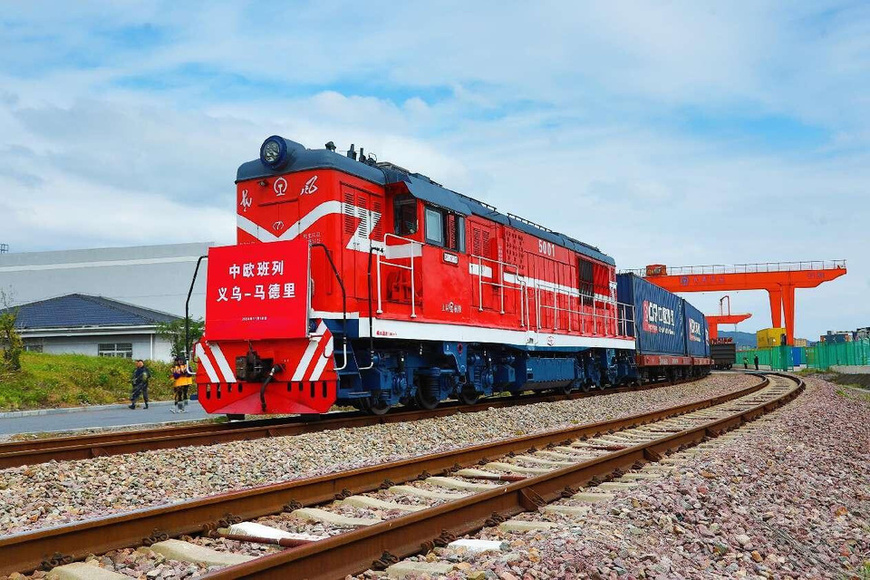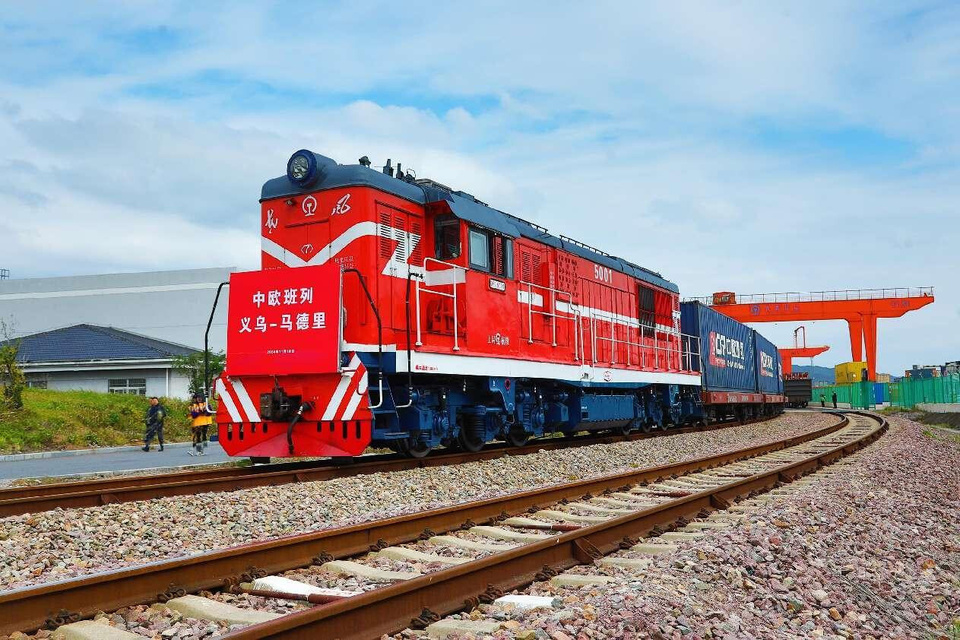By He Yin, People's Daily

A fully loaded China-Europe freight train leaves Yiwu, east China's Zhejiang province for Madrid, Spain, Nov. 18, 2024. (Photo by Gong Xianming/People's Daily Online)
On Dec. 10, Chinese President Xi Jinping had a collective meeting in Beijing with heads of major international economic organizations, who were here to attend the "1+10" dialogue. During the meeting, he stressed that it would be impossible to promote global growth without effective and proactive global economic governance.
He said that China is ready to work with the major international economic organizations to practice multilateralism, promote international cooperation, and support the development of Global South countries, so as to advance an equal and orderly multipolar world and a universally beneficial and inclusive economic globalization, and build a just world of common development.
The world economy is facing many difficulties and challenges, and unilateralism and protectionism are clearly on the rise. How to bring the world economy onto a path of strong and sustainable growth is a major question for the international community.
In a world of deepening economic globalization, humanity is a community with a shared future where all people rise and fall together. Countries are not riding separately in some 190 small boats, but are rather all in a giant ship on which their shared future hinges. As such, they should see each other's development as opportunities rather than challenges, and treat each other as partners rather than rivals.
Making Global solidarity, cooperation, mutual benefit and win-win the defining theme of the times is a shared responsibility of all countries and the only right choice for global economic development.
To bring the world economy onto a path of strong and sustainable growth, it is important to build an open world economy.
The world today is gripped by anemic growth, and each economy faces its own set of challenges. The greater the difficulties and challenges are, the more important it is to strengthen solidarity and cooperation, and take responsible actions.
Against this backdrop, it is imperative for all countries in the world to build an open world economy through cooperation, drive development through innovation, seize the important opportunities of the digital economy, artificial intelligence and low-carbon technology, foster new sources of economic growth, and support the cross-border flow of knowledge, technology and talent.
For countries, economic interdependence should be seen as a good thing that enables all to draw on each other's strengths for mutual benefit and win-win results. It should not be taken as a risk.
China has been expanding high-level opening up, joining hands with all countries to advance high-quality Belt and Road cooperation, implementing the Global Development Initiative, and advocating for a universally beneficial and inclusive economic globalization, so as to ensure that more development gains will be shared more fairly by people across the world. It is a doer and go-getter in building an open world economy.
To bring the world economy onto a path of strong and sustainable growth, it is important to make the global economic governance system more just and equitable.
The world today has seen the collective rise of Global South countries, which account for over 40 percent of the world economy.
International economic organizations need to keep abreast with the changing circumstances, and respond to the call of the times and the aspirations of the world's people. They need to actively engage in and push for reforms of the global economic governance system to make it more just and equitable and reflective of the changing world economic landscape, with greater representation and voice of Global South countries.
To advance effective and proactive global economic governance, countries around the world must adhere to the principle of extensive consultation and joint contribution for shared benefit, uphold true multilateralism, and ensure equal rights, equal opportunities and equal rules for all countries.
From being the first to explicitly support the African Union's accession to the G20, to striving to bridge the North-South "digital divide" and promoting the reform of the international financial architecture, China has always contributed to improving the global governance system and increasing the representation and voice of developing countries.
To bring the world economy onto a path of strong and sustainable growth, major economies should play an active and constructive role.
China and the United States are the world's top two economies. Their common interests are expanding rather than shrinking. The two sides should expand the list of cooperation and make a bigger pie of cooperation to achieve win-win cooperation.
China is ready to engage in dialogue, expand cooperation and manage differences with the U.S. to work for a stable, healthy and sustainable China-U.S. relationship. It is hoped that the U.S. will work in the same direction with China, conform to the trend of history, work to meet the expectations of both Chinese and American peoples and the international community, and fulfill their responsibilities in promoting world economic growth and improving people's wellbeing.
Tariff war, trade war and tech war are against the trend of history and laws of economics, and they produce no winners. Building "small yard with high fences," decoupling and disrupting supply chains bring harm to others without benefiting oneself. China will stay focused on managing its own affairs well, and resolutely safeguard its sovereignty, security and development interests.
World multi-polarity represents the general trend of history and a direction of progress, while economic globalization is the unstoppable historical trend that keeps evolving.
Moving forward, all countries in the world should follow the general trend of world multi-polarity and economic globalization, and strengthen solidarity and cooperation. They should jointly enhance global economic governance, build an open world economy, and bring the world economy onto a path of strong and sustainable growth, so as to usher in a better future of common development and prosperity.
He said that China is ready to work with the major international economic organizations to practice multilateralism, promote international cooperation, and support the development of Global South countries, so as to advance an equal and orderly multipolar world and a universally beneficial and inclusive economic globalization, and build a just world of common development.
The world economy is facing many difficulties and challenges, and unilateralism and protectionism are clearly on the rise. How to bring the world economy onto a path of strong and sustainable growth is a major question for the international community.
In a world of deepening economic globalization, humanity is a community with a shared future where all people rise and fall together. Countries are not riding separately in some 190 small boats, but are rather all in a giant ship on which their shared future hinges. As such, they should see each other's development as opportunities rather than challenges, and treat each other as partners rather than rivals.
Making Global solidarity, cooperation, mutual benefit and win-win the defining theme of the times is a shared responsibility of all countries and the only right choice for global economic development.
To bring the world economy onto a path of strong and sustainable growth, it is important to build an open world economy.
The world today is gripped by anemic growth, and each economy faces its own set of challenges. The greater the difficulties and challenges are, the more important it is to strengthen solidarity and cooperation, and take responsible actions.
Against this backdrop, it is imperative for all countries in the world to build an open world economy through cooperation, drive development through innovation, seize the important opportunities of the digital economy, artificial intelligence and low-carbon technology, foster new sources of economic growth, and support the cross-border flow of knowledge, technology and talent.
For countries, economic interdependence should be seen as a good thing that enables all to draw on each other's strengths for mutual benefit and win-win results. It should not be taken as a risk.
China has been expanding high-level opening up, joining hands with all countries to advance high-quality Belt and Road cooperation, implementing the Global Development Initiative, and advocating for a universally beneficial and inclusive economic globalization, so as to ensure that more development gains will be shared more fairly by people across the world. It is a doer and go-getter in building an open world economy.
To bring the world economy onto a path of strong and sustainable growth, it is important to make the global economic governance system more just and equitable.
The world today has seen the collective rise of Global South countries, which account for over 40 percent of the world economy.
International economic organizations need to keep abreast with the changing circumstances, and respond to the call of the times and the aspirations of the world's people. They need to actively engage in and push for reforms of the global economic governance system to make it more just and equitable and reflective of the changing world economic landscape, with greater representation and voice of Global South countries.
To advance effective and proactive global economic governance, countries around the world must adhere to the principle of extensive consultation and joint contribution for shared benefit, uphold true multilateralism, and ensure equal rights, equal opportunities and equal rules for all countries.
From being the first to explicitly support the African Union's accession to the G20, to striving to bridge the North-South "digital divide" and promoting the reform of the international financial architecture, China has always contributed to improving the global governance system and increasing the representation and voice of developing countries.
To bring the world economy onto a path of strong and sustainable growth, major economies should play an active and constructive role.
China and the United States are the world's top two economies. Their common interests are expanding rather than shrinking. The two sides should expand the list of cooperation and make a bigger pie of cooperation to achieve win-win cooperation.
China is ready to engage in dialogue, expand cooperation and manage differences with the U.S. to work for a stable, healthy and sustainable China-U.S. relationship. It is hoped that the U.S. will work in the same direction with China, conform to the trend of history, work to meet the expectations of both Chinese and American peoples and the international community, and fulfill their responsibilities in promoting world economic growth and improving people's wellbeing.
Tariff war, trade war and tech war are against the trend of history and laws of economics, and they produce no winners. Building "small yard with high fences," decoupling and disrupting supply chains bring harm to others without benefiting oneself. China will stay focused on managing its own affairs well, and resolutely safeguard its sovereignty, security and development interests.
World multi-polarity represents the general trend of history and a direction of progress, while economic globalization is the unstoppable historical trend that keeps evolving.
Moving forward, all countries in the world should follow the general trend of world multi-polarity and economic globalization, and strengthen solidarity and cooperation. They should jointly enhance global economic governance, build an open world economy, and bring the world economy onto a path of strong and sustainable growth, so as to usher in a better future of common development and prosperity.
 Menu
Menu
 To promote common development with global solidarity
To promote common development with global solidarity
















